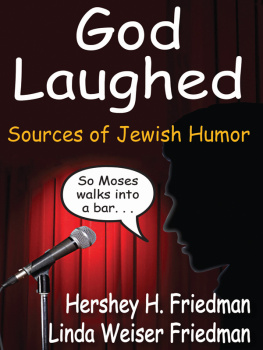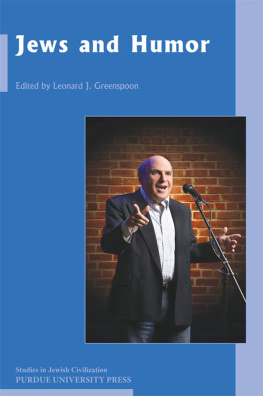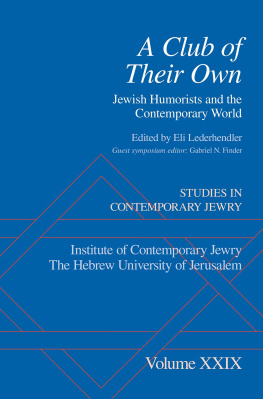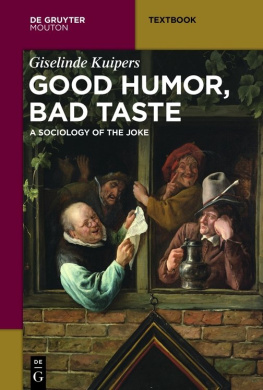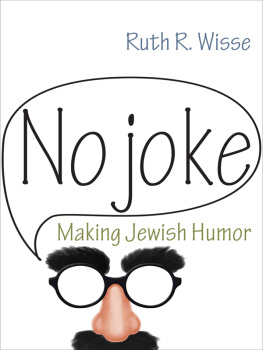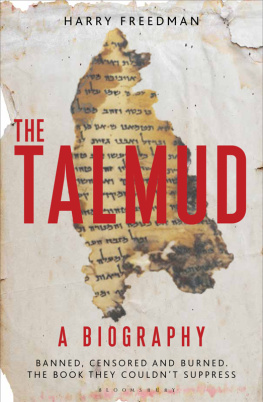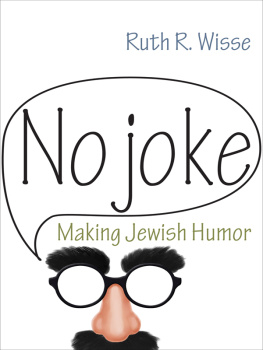


Copyright 2014 by Transaction Publishers, New Brunswick, New Jersey.
All rights reserved under International and Pan-American Copyright Conventions. No part of this book may be reproduced or transmitted in any form or by any means, electronic or mechanical, including photocopy, recording, or any information storage and retrieval system, without prior permission in writing from the publisher. All inquiries should be addressed to Transaction Publishers, 10 Corporate Place South, Piscataway, New Jersey 08854. www.transactionpub.com
This book is printed on acid-free paper that meets the American National Standard for Permanence of Paper for Printed Library Materials.
Library of Congress Catalog Number: 2013036452
ISBN: 978-1-4128-5376-7
Printed in the United States of America
Library of Congress Cataloging-in-Publication Data
Friedman, Hershey H.
God laughed : sources of Jewish humor / Hershey H. Friedman and Linda Weiser Friedman.
pages cm
Includes bibliographical references and index.
ISBN 978-1-4128-5376-7
1. Jewish wit and humorHistory and criticism. 2. Wit and humor in the Bible. 3. Wit and humor in rabbinical literature. I. Friedman, Linda Weiser. II. Title.
PN6231.J5F77 2014
809.7935203924dc23
2013036452
This book is dedicated to my late father and teacher, Avraham Shlomo b. Yitzchak Asher Friedman ZL, who instilled in me a great love of the sages in the Talmud. I will always remember his wonderful stories of the Talmudic sages, and I am certain that he is now enjoying their company in the world of truth.
Hershey H. Friedman
Also dedicated to our children and grandchildren, who somehow manage to always keep us laughing.
Linda and Hershey H. Friedman
Preface
Among the major works that have influenced the Jewish people are the Hebrew Bible (i.e., Tanach ), the Talmud, and the Midrash, all of which are replete with humor and wit. (Really!) This humor has had a profound effect on the way the Jewish people see the world and has sustained them through millennia of hardships and suffering. Inevitably, it has influenced a tremendous body of humor that is uniquely Jewish. Jewish humor has, itself, influenced several generations of comics, as well as many genres of humor.
This book is a work of love for us and has been a joy to create. In it, we first examine the Hebrew Bible. True, there are no jokes in the Bible but there is an abundance of wit and humor. Some of the types of humor found in the Hebrew Bible include sarcasm, irony, wordplays, humorous imagery, and humorous stories and situations. Much of this humor can only be appreciated if read in the original Hebrew and is lost in a translation. Since, to the believer, the Bible is a moral document, not merely an entertaining storybook, one might be moved to consider the purpose of using humorous devices in the Holy Scriptures. An examination of the collection in this book brings at least one important purpose to mind: Humor narrows the distance between teller and listener, and thus brings God closer to humankind. In addition, laughter is frequently employed as an effective way of indicating the folly of idolatry and other sins.
The Talmud and Midrash are also replete with humor. This is not surprising given that the Talmud and Midrash are oral traditions based on the Torah, the written law. Spalding notes that both the Talmud and the Bible have a fair share of wit and humor. Some of the humor of the Talmud may be found in popular books such as William Novak and Moshe Waldokss Big Book of Jewish Humor and Hyam Maccobys The Day God Laughed .
A note about the translations in this book is in order. Yevgeny Yevtushenko once famously said, Translations are like women. When they are faithful they are not beautiful, and when they are beautiful they are not faithful. We decided to go for translations that are closely faithful to the texts from which they are taken. This results in passages that may seem a bit stilted to our ears.
Most of the jokes in this book are olduhmm, classics. Where we used a reference for the particular rendering of the joke cited, the reference is named as source. For the most part, there is no definitive source for any of these jokes.
We hope you have as much fun reading this book as we did writing it!
Hersh and Linda Friedman
New York City
Acknowledgements
This book is a long time in the making. Much of the research has been conducted over the past twenty years and some of the writing goes back almost that far. Some of the material has had earlier incarnations in print. For example, Friedman (2000), Friedman (1998), and Friedman and Lipman (1999). Many thanks to the journal Humor: International Journal of Humor Research for permission to reuse much of the material included in Chapter 4.
A project such as this one cannot be completed without the assistance of a great many individuals: editors, reviewers, encouragers, readersyou know who you are. In particular, the authors wish to thank Rachel F. Adler, William D. Adler, Deborah Friedman, Esther Friedman, Jeffrey Helmreich, William Helmreich, Daniel Hoffman, Sarah F. Hoffman, Steve Lipman, Ryan Shapin, Avi Weisel, Pearl Weisel, and Norman Weiser. And a very sincere thank you to the helpful and professional team of editors at Transaction Publishers.
Part I
Introduction
Studying Jewish Humor
Engaging in scholarly discourse on humor is probably the surest way to put ones audience to sleep anduhmto actually not be funny. Still, we try in this volume to walk the admittedly very fine line between scholarship and entertainment.
What is humor? The bottom line is that humor has the ability to make people laugh, smile, or chuckle, at least inwardly. There are, of course, many different types of humor, including puns, wordplay, riddles, jokes, satire, lampoon, sarcasm, irony, wit, black humor, slapstick, farce, burlesque, caricature, and parody. The differences among these are not always great. In particular, burlesque, caricature, and parody are very much alike and refer to literary or dramatic works that mimic serious works in order to achieve a humorous or satiric effect. Likewise, the difference between satire and lampoon is not great.
Human beings seem to naturally gravitate toward all forms of humor. Indeed, humor has been shown to be useful and effective in many different areas of human endeavor, including medicine, counseling, education, advertising and, of course, communication.
Scholars and other mavens return repeatedly to consider whether there is such a thing as Jewish humor. While opinions vary, we prefer to believe that Jewish humor exists, and that it has its own peculiar characteristics and unique elements. Conversely, if the Jews in a joke can easily be replaced by individuals of some other ethnicity, that should not really be considered Jewish humor. Examples that fail this test can be found among many supposedly Jewish jokes about sex and marriage.
Wikipedia, the online encyclopedia, notes that Jewish humor is rooted in several traditions.
One thing is certain, a very high percentage of major American comics are Jewish. A traditional number mentioned is 80 percent.
David Steinberg: Ethnic groups are attracted to comedy. When the Jews were in the ghetto, they became the comedians because they were the outsiders.
Next page
